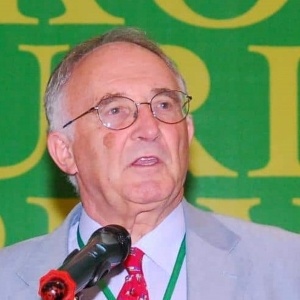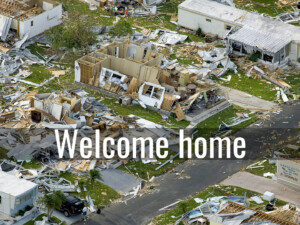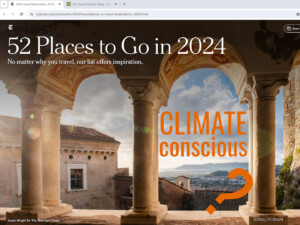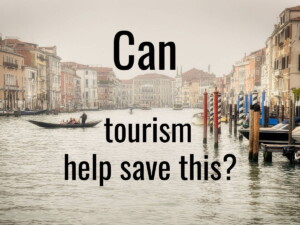Tourism & ‘climate emergency’: It’s the metrics, stupid

Geoffrey Lipman of “Good Tourism” Partner SUNx shares a unique “GT” Insight into a TRINET discussion currently underway about tourism and climate change.
TRINET is the Tourism Research Information Network, an email distribution list that links global tourism scholars.
This is an adaptation of Prof Lipman’s recent post to TRINET in which he argues why those who would declare an emergency should be prepared to declare the effectiveness of their emergency response.
When I read my friend Xavier Font’s excellent TRINET piece on Tourism Declares a Climate Emergency, I was reminded of Bill Clinton’s epic slogan: “It’s the economy, stupid.”
For climate, simply put: It’s the metrics, stupid.
Expressed another way: If you can’t measure it, you can’t manage it.
The global response to the climate crisis is all about measuring global carbon reduction through aggregating 193 countries’ Nationally Determined Contributions (NDCs), which are filed annually with the United Nations Framework Convention on Climate Change (UNFCCC) and intensified over time. It makes total sense for our critically-important sector and all its stakeholders to be acting to reduce our greenhouse gases (GHG) in ways that can ultimately meet these accepted global norms.
To draw a parallel, in 1990 there was no measurement of travel & tourism’s contribution to gross domestic product (GDP), employment, or even trade reflected in national accounts. The World Travel & Tourism Council (WTTC), where I was the President at the time, created what is now the widely recognised and used Satellite Account data sets that form the basis of virtually all industry and government planning and positioning.
Currently our sector is just not doing this adequately for climate-related emissions. And while the Tourism Declares framework, which Xavier outlines, is a first step in the right direction — organisations and individuals state their carbon reduction ambitions — we need a second step which is to shift ambitions into actions using the same UNFCCC metrics.
It is precisely for this reason that SUNx Malta, with the support of the Government of Malta and working with WTTC, has invested in a technology platform and a services team to provide that essential second step. We call it the Climate Friendly Travel Registry (CFT Registry). (I know it’s not a very sexy name, but Malta has hosted a Shipping Registry for half a century and UNFCCC hosts the UN Climate Registry).
Also see David Gillbanks’ op-ed
“Don’t panic: Opportunity, ingenuity will give us climate-friendly travel”
The CFT Registry, which was constructed by the same team that built the UN Registry, launched at the end of 2020 using identical metrics. Patricia Espinosa, the UN Climate Chief, welcomed it: “I congratulate the WTTC on the Climate Friendly Travel Registry launched jointly with SUNx Malta and welcome the opportunities that this offers to travel & tourism organisations to develop, register, and promote their climate strategies, plans, and achievements in support of the goals of the Paris Agreement.”
The fact is that to be taken seriously in climate policy decision-making circles we need meaningful metrics for the travel & tourism sector’s 30-year — yes, 30-year — transformation to the Paris 1.5 world. The disparate Tourism Declares or similar ambitions need to be aligned with global norms. It is true that some are doing it through membership in the Science Based Targets or UN Global Compact initiatives, but the majority are not. How could the many individuals who have declared ever do that, for example?
I spoke at length to one person who is very well respected on TRINET and was told that it’s just too hard; that these general non-tourism approaches won’t help develop coherent sets of travel & tourism-relevant data. Yet that is precisely what the CFT Registry has been designed to do.
Also see Tanner C Knorr’s “GT” Insight
“Climate change, COVID-19, and the need for global systemic change”
To help companies and communities file and fulfil their sustainability (Sustainable Development Goals) and climate-related (Paris) plans, we have created an easily-accessible database of innovation, good practice, and advisory services. We are also reaching out to industry organisations and building channels to consumers.
This is a slow process as there is, sadly, a kind of inherent NIMBY (not in my back yard) suspicion, which we have encountered. But we remain optimistic that over time and with good-faith intentions, all will see the cross-industry benefits.
But we cannot procrastinate. There is not as much time as many like to think. To get to net carbon-neutral by 2050 — or, more rationally, to zero GHG if we are to respond to the Intergovernmental Panel on Climate Change (IPCC)‘s science-based assessments — we have to start now and progressively transform.
The CFT Registry is ready now to help our industry do exactly that.
What do you think? Share a short anecdote or comment below. Or write a deeper “GT” Insight. The “Good Tourism” Blog welcomes diversity of opinion and perspective about travel & tourism because travel & tourism is everyone’s business.
Featured image (top of post): It’s the metrics, stupid. Image: Storm cloud background by FelixMittermeier (CC0) via Pixabay. Stat overlay by postman85 (CC0) via Pixabay.
About the author

Geoffrey Lipman is a former top official and innovator at the International Air Transport Association (IATA), World Travel & Tourism Council (WTTC), and United Nations World Tourism Organization (UNWTO). In his current roles as chief disruption architect and professor at GreenEarth.travel and co-founder of the SUNx Program, Prof Lipman advocates concepts such as “green growth”, “impact-travel”, and “travelism”, and asserts that climate change is “existential”. His firm belief that climate change has the potential to knock out our species has not only inspired Prof Lipman to add the “x” to SUNx, but is also driving him to pursue the most ambitious project of his career; the realisation of a Strong Universal Network (SUNx) that will empower and resource current and emerging generations who must face the existential threat head on.





